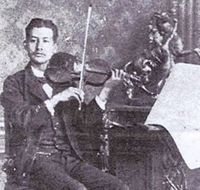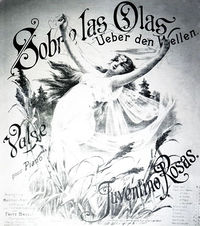Annotation:Over the Waves (1): Difference between revisions
No edit summary |
Alan Snyder (talk | contribs) m Fix HTML |
||
| Line 2: | Line 2: | ||
---- | ---- | ||
<p><font face="garamond, serif" size="4"> | <p><font face="garamond, serif" size="4"> | ||
'''OVER THE WAVES [1].''' AKA - "Sobre las Olas." Old-Time, Waltz. USA; Ala., Ga., Ky., Pa., Mo., S.D., La., Arizona. C Major (Ford): G Major (Guntharp): G Major ('A' part) & C Major ('B' part). Standard tuning (fiddle). AABB (Guntharp): ABC (Phillips). A popular waltz that found a home in traditional fiddle repertory. One modern source maintained the tune was popular in Spain in the 15th century, while others attribute it to Strauss (The Waltz King) | '''OVER THE WAVES [1].''' AKA - "Sobre las Olas." Old-Time, Waltz. USA; Ala., Ga., Ky., Pa., Mo., S.D., La., Arizona. C Major (Ford): G Major (Guntharp): G Major ('A' part) & C Major ('B' part). Standard tuning (fiddle). AABB (Guntharp): ABC (Phillips). A popular waltz that found a home in traditional fiddle repertory. One modern source maintained the tune was popular in Spain in the 15th century, while others attribute it to Strauss (The Waltz King); however, Charles Wolfe has determined it was written by Mexican composer Juventino Rosas [http://en.wikipedia.org/wiki/Juventino_Rosas] (1868-1894). Rosas was a pure-blooded Otomi Indian and a fiddler and violinist so accomplished that at age 15 he obtained a job as first violinist in a touring opera company. After a stint in the Mexican army, he wrote the tune in 1884 as a set of waltz's called "Sobre las Olas" (Over the Waves), which he and his band played to much popular acclaim at the worlds fair (the "World Cotton Centennial") in New Orleans that same year. The melody quickly entered old time tradition and was common in many parts of the country {Charles Wolfe, '''The Devil's Box''', vol. 10, No. 3, September 1976}; in fact, musicologist Charles Wolfe calls it "one of the most popular fiddle tunes in modern history" ('''Devil's Box''', Dec. 1982). The available literature supports this claim: for example, Arizona fiddler Kenner C. Kartchner said: "(Hearing the melody was) One of my first memories about 1893" (Shumway). Rosas performed again at the Chicago World's Fair in 1893 as well, and by that time his most famous composition, "Sobre las Olas (Over the Waves)," was famous world-wide. He died the next year in Cuba while on tour, but is remembered in Mexico as the 'Waltz King', where there is a town named after him. | ||
<br> | |||
<br> | <br> | ||
Originally Rosas' tune had five parts, sometimes with an added introduction and extended coda, however, in traditional repertory it is almost always played as a two or three-part tune. It was also composed in the key of 'G', requiring position playing at the end of the first part (a key change to 'D' by fiddlers allows for first position playing). The tune was recorded for the Library of Congress by musicologist/folklorist Vance Randolph from the playing of Ozarks Mountains fiddlers in the early 1940's. It appears in a list of the repertoire of Maine fiddler Mellie Dunham (the elderly Dunham was Henry Ford's champion fiddler in the late 1920's) | Originally Rosas' tune had five parts, sometimes with an added introduction and extended coda, however, in traditional repertory it is almost always played as a two or three-part tune. It was also composed in the key of 'G', requiring position playing at the end of the first part (a key change to 'D' by fiddlers allows for first position playing). The tune was recorded for the Library of Congress by musicologist/folklorist Vance Randolph from the playing of Ozarks Mountains fiddlers in the early 1940's. It appears in a list of the repertoire of Maine fiddler Mellie Dunham (the elderly Dunham was Henry Ford's champion fiddler in the late 1920's) and was heard commonly in Georgia in the early 1920's. African-American fiddler Cuje Bertram of the Cumberland Plateau region of Kentucky recorded the tune on a 1970 home recording, made for his family. See also Narmour and Smith's unusual version of the tune recorded as "[[Winona Echoes]]." | ||
<br> | <br> | ||
<br> | <br> | ||
</font></p> | </font></p> | ||
[[File:rosas.jpg|200px|thumb|left|Juventino Rosas]] | |||
[[File:overthewaves.jpg|200px|thumb|right|]] | |||
<p><font face="garamond, serif" size="4"> | <p><font face="garamond, serif" size="4"> | ||
''Sources for notated versions'': Harry Daddario (Buffalo Valley region, Pa.) [Guntharp]; Kenny Baker and Jehile Kirkhuff (Pa.) [Phillips]. | ''Sources for notated versions'': Harry Daddario (Buffalo Valley region, Pa.) [Guntharp]; Kenny Baker and Jehile Kirkhuff (Pa.) [Phillips]. | ||
| Line 20: | Line 22: | ||
</font></p> | </font></p> | ||
<p><font face="garamond, serif" size="4"> | <p><font face="garamond, serif" size="4"> | ||
''Recorded sources'': <font color=teal>Conqueror 8078, Doc Roberts (Ky.), 1931. County 719, Kenny Baker | ''Recorded sources'': | ||
<font color=teal> | |||
Conqueror 8078, Doc Roberts (Ky.), 1931. | |||
County 719, Kenny Baker – "Portrait of a Bluegrass Fiddler" (1968). | |||
County 733, "The Legend of Clark Kessinger." | |||
Decca 5041 (78 RPM), Stripling Brothers (Ala.) (1934). | |||
Marimac 9017, Vesta Johnson (Mo.) – "Down Home Rag." | |||
Missouri State Old Time Fiddlers' Association, Pete McMahon – "Kansas City Rag." | |||
Missouri State Old Time Fiddlers' Association, Vee Latty (1910-1956) – "Fever in the South." | |||
Opera 108 (78 RPM), Floyd LeBlanc, 1948 (Cajun recording). | |||
Rural Records RRCF 251, Curly Fox (1970). | |||
Voyager VRCD 344, Howard Marshall & John Williams – "Fiddling Missouri" (1999. Learned from his grandparents in the 1940's and 50's and from fiddler Taylor McBaine). | |||
Versions also recorded by Jimmy Wilson's Catfish Band (Texas, 1925; band influenced Bob Wills), Humphrey Brothers (OKeh Records), Perry Brothers (Decca Records), Bob Wills (Texas), Hugh Ashley (Arkansas), and the Mitchell (S.D.) Old Time Orchestra (Library of Congress recording). In the repertoire of African-American Ky. fiddler Cuje Bertram. Reed Island Rounders - "Goin' Home" (2002). | |||
</font> | |||
<br> | <br> | ||
<br> | <br> | ||
| Line 31: | Line 47: | ||
</font></p> | </font></p> | ||
<br> | <br> | ||
<br> | <br style="clear:both"/> | ||
---- | ---- | ||
=='''Back to [[{{BASEPAGENAME}}]]'''== | =='''Back to [[{{BASEPAGENAME}}]]'''== | ||
Revision as of 04:49, 29 December 2016
Back to Over the Waves (1)
OVER THE WAVES [1]. AKA - "Sobre las Olas." Old-Time, Waltz. USA; Ala., Ga., Ky., Pa., Mo., S.D., La., Arizona. C Major (Ford): G Major (Guntharp): G Major ('A' part) & C Major ('B' part). Standard tuning (fiddle). AABB (Guntharp): ABC (Phillips). A popular waltz that found a home in traditional fiddle repertory. One modern source maintained the tune was popular in Spain in the 15th century, while others attribute it to Strauss (The Waltz King); however, Charles Wolfe has determined it was written by Mexican composer Juventino Rosas [1] (1868-1894). Rosas was a pure-blooded Otomi Indian and a fiddler and violinist so accomplished that at age 15 he obtained a job as first violinist in a touring opera company. After a stint in the Mexican army, he wrote the tune in 1884 as a set of waltz's called "Sobre las Olas" (Over the Waves), which he and his band played to much popular acclaim at the worlds fair (the "World Cotton Centennial") in New Orleans that same year. The melody quickly entered old time tradition and was common in many parts of the country {Charles Wolfe, The Devil's Box, vol. 10, No. 3, September 1976}; in fact, musicologist Charles Wolfe calls it "one of the most popular fiddle tunes in modern history" (Devil's Box, Dec. 1982). The available literature supports this claim: for example, Arizona fiddler Kenner C. Kartchner said: "(Hearing the melody was) One of my first memories about 1893" (Shumway). Rosas performed again at the Chicago World's Fair in 1893 as well, and by that time his most famous composition, "Sobre las Olas (Over the Waves)," was famous world-wide. He died the next year in Cuba while on tour, but is remembered in Mexico as the 'Waltz King', where there is a town named after him.
Originally Rosas' tune had five parts, sometimes with an added introduction and extended coda, however, in traditional repertory it is almost always played as a two or three-part tune. It was also composed in the key of 'G', requiring position playing at the end of the first part (a key change to 'D' by fiddlers allows for first position playing). The tune was recorded for the Library of Congress by musicologist/folklorist Vance Randolph from the playing of Ozarks Mountains fiddlers in the early 1940's. It appears in a list of the repertoire of Maine fiddler Mellie Dunham (the elderly Dunham was Henry Ford's champion fiddler in the late 1920's) and was heard commonly in Georgia in the early 1920's. African-American fiddler Cuje Bertram of the Cumberland Plateau region of Kentucky recorded the tune on a 1970 home recording, made for his family. See also Narmour and Smith's unusual version of the tune recorded as "Winona Echoes."


Sources for notated versions: Harry Daddario (Buffalo Valley region, Pa.) [Guntharp]; Kenny Baker and Jehile Kirkhuff (Pa.) [Phillips].
Printed sources: Ford (Traditional Music in America), 1940; p. 144. Guntharp (Learning the Fiddlers Ways), 1980; p. 106. Phillips (Traditional American Fiddle Tunes, vol. 2), 1995; pp. 290-291.
Recorded sources:
Conqueror 8078, Doc Roberts (Ky.), 1931.
County 719, Kenny Baker – "Portrait of a Bluegrass Fiddler" (1968).
County 733, "The Legend of Clark Kessinger."
Decca 5041 (78 RPM), Stripling Brothers (Ala.) (1934).
Marimac 9017, Vesta Johnson (Mo.) – "Down Home Rag."
Missouri State Old Time Fiddlers' Association, Pete McMahon – "Kansas City Rag."
Missouri State Old Time Fiddlers' Association, Vee Latty (1910-1956) – "Fever in the South."
Opera 108 (78 RPM), Floyd LeBlanc, 1948 (Cajun recording).
Rural Records RRCF 251, Curly Fox (1970).
Voyager VRCD 344, Howard Marshall & John Williams – "Fiddling Missouri" (1999. Learned from his grandparents in the 1940's and 50's and from fiddler Taylor McBaine).
Versions also recorded by Jimmy Wilson's Catfish Band (Texas, 1925; band influenced Bob Wills), Humphrey Brothers (OKeh Records), Perry Brothers (Decca Records), Bob Wills (Texas), Hugh Ashley (Arkansas), and the Mitchell (S.D.) Old Time Orchestra (Library of Congress recording). In the repertoire of African-American Ky. fiddler Cuje Bertram. Reed Island Rounders - "Goin' Home" (2002).
Source for notated version:
Jane Keefer's Folk Music Index: An Index to Recorded Sources [2]
Hear Cecil & John Snow play the waltz at Slippery Hill [3]
See Austin Rogers' transcription of Doc Roberts version [4]

